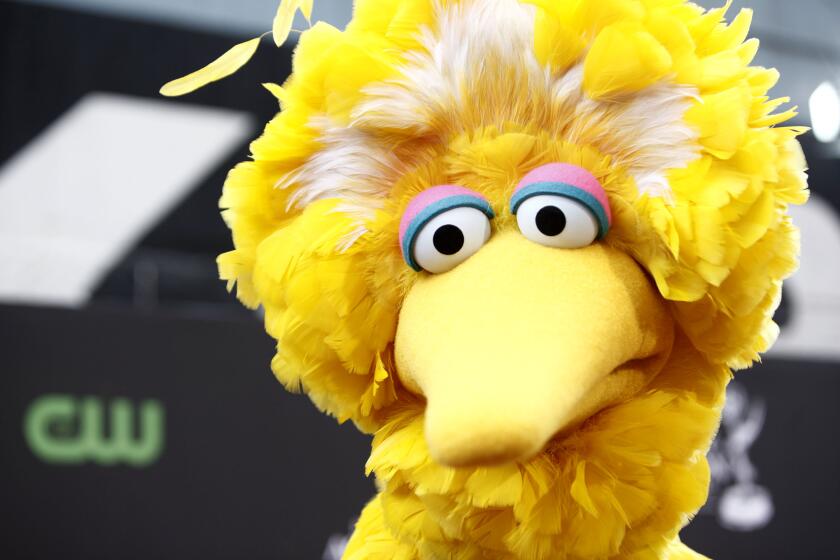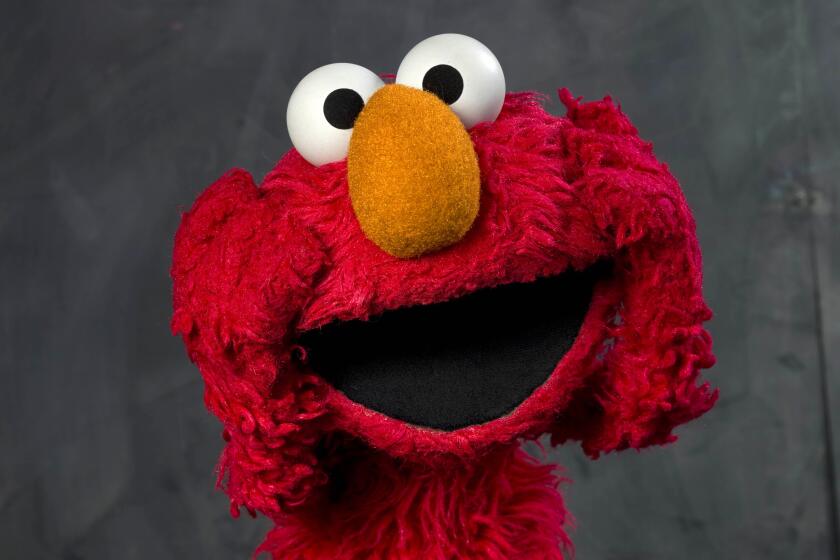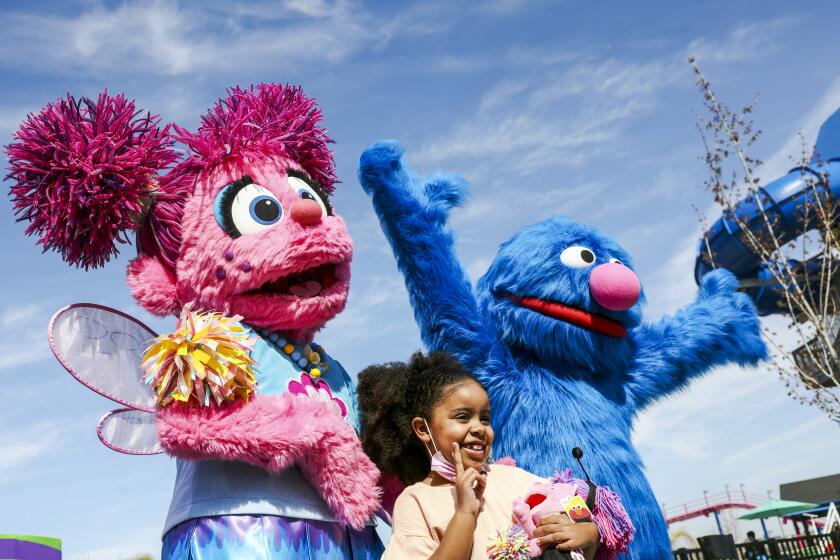Cookie Monster, Big Bird and Elmo need new ‘Sesame Street’ address

- Share via
Big Bird might soon ask: “Can you tell me how to get to Sesame Street?”
After a nearly decade-long run with HBO, the group that produces “Sesame Street” is seeking a new television partner to continue production and distribution of the beloved program. One of the world’s most recognizable children’s shows will launch its 55th season next month — the final season under its expiring HBO deal.
HBO’s parent company, Warner Bros. Discovery, no longer will help finance production of new original “Sesame Street” episodes. This fall, the company structured a new licensing agreement with Sesame Workshop that enables the company to continue to play older “Sesame Street” episodes on HBO and its streaming service, Max, through 2027.
“It has been a wonderful, creative experience working with everyone at ‘Sesame Street’ on the iconic children’s series and we are thrilled to be able to keep some of the library series on Max in the U.S.,” Warner Bros. Discovery said in a statement.
However, the Muppet characters no longer hit a sweet spot for the cost-conscious David Zaslav-run media company.
“Based on consumer usage and feedback, we’ve had to prioritize our focus on stories for adults and families,” Warner Bros. Discovery said in its statement. “New episodes from ‘Sesame Street,’ at this time, are not as core to our strategy.”
This means another fork in the road for Cookie Monster, Elmo and Bert and Ernie.
The New York-based nonprofit Sesame Workshop, which produces the show, declined to discuss possible plans or talks with other potential distributors.
“We will continue to invest in our best-in-class programming and look forward to announcing our new distribution plans in the coming months, ensuring that ‘Sesame Street’ reaches as many children as possible for generations to come,” Sesame Workshop said in a statement.
Mental and emotional health is on a par with physical health and financial security when it comes to negative impacts on overall well-being, researchers say.
Industry experts expect more sunny days for the show.
“There are very few intellectual properties like ‘Sesame Street,’ made in the last 100 years, that are still worth investing in,” said Russell Hicks, an independent producer and former Nickelodeon content president. “It’s a classic property with classic characters that have generational appeal: Who doesn’t love Oscar the Grouch or Cookie Monster?”
A decade ago, HBO executives were thrilled to land the iconic characters as the network geared up for a big push into streaming. The executives wanted a kid-friendly franchise to complement their decidedly adult fare that included “Game of Thrones” and “Veep.”
HBO’s 2015 deal also threw a financial lifeline to Sesame Workshop, which has produced the show since 1969. At the time, the nonprofit’s executives were grasping for resources to cover the expense of revitalizing and producing new episodes of the show beyond fees from longtime public broadcaster PBS.
In an unusual arrangement, HBO licensed first-run shows and allowed those episodes to air on PBS nine months after their HBO debut. The goal was to ensure that “Sesame Street” remained widely available and allow PBS to stay true to its public-service mission.
HBO executives had big plans for the franchise, even producing a talk show — “Not Too Late Show With Elmo” — which featured the furry red monster interacting with real-life celebrities, including the Jonas Brothers. The Elmo show was canceled after two seasons.
Our world is changing fast. It makes sense that the “Sesame Street” creators want to teach kids to live in that world.
“Sesame Street” is reentering the cluttered market at a tumultuous time. Media executives have become laser-focused on returns on programming investments and the bottom line.
The show’s license fee could be dampened, industry insiders said, because “Sesame Street” is available on numerous platforms, including PBS, streaming service Max and a YouTube channel with 25 million subscribers.
Another complication: preschool kids don’t typically differentiate between an original episode from library content. What’s old may feel new to them.
Members of the Writers Guild of America at Sesame Workshop, the nonprofit organization behind ‘Sesame Street,’ have struck a deal to avert a strike.
Securing a new partner will be critical to Sesame Workshop, which relies heavily on the distribution fees it receives for “Sesame Street” to finance its operations and fund numerous children’s educational programs.
The nonprofit group collected $99 million in program distribution fees in 2022, compared with $148 million a year earlier, according to recent tax filings.
In 2022, Warner Bros. Discovery programmers removed more than 200 “Sesame Street” episodes from the company’s streaming service as part of a widespread corporate cost-cutting.
Analysts point to the David Zaslav-led company’s expected loss of the NBA contract and underperformance in key business units during the last two years.
Now it may be up to another streaming service, such as Apple TV+, Netflix, Amazon Prime, Disney+ or NBCUniversal’s Peacock, to rescue the show.
Apple TV+ has dipped into nostalgic programming, securing rights to another Jim Henson-created Muppet band, “Fraggle Rock: Back to the Rock.” The Apple service also scooped up rights to Charles M. Schulz’s “Peanuts” characters.
Instead of airing on ABC, holiday classics featuring Charlie Brown, Linus and Snoopy are prominently featured on Apple’s streaming platform, sparking a Change.Org petition calling for the return of the characters to broadcast TV. An Apple spokesperson declined to comment.
Hicks said Disney could bolster its offerings with new educationally minded friends for Mickey Mouse, Woody the toy cowboy or Winnie-the-Pooh. Twenty years ago, Disney acquired “The Muppets,” including Kermit the Frog and Miss Piggy, from the Jim Henson Co. in a deal then valued at $90 million. Disney declined to comment.
“Sesame Street” has contemporary appeal because parents grew up with the gang. Over the years, new characters have been added to keep the show culturally relevant. And the characters have become social media stars, including Elmo, who caused a global sensation last January with an innocuous check-in post on X (formerly Twitter) asking: “How is everybody doing?”
Elmo’s innocent tweet on Monday prompted thousands of X users to unload their mental health struggles in replies — from the personal to the global.
In addition, programmers recognize that children’s programming is a key ingredient to recruit streaming subscribers.
“It’s an entrance point for mothers to come into a streaming service,” Hicks said. “Then they say: What else do you have for me?”
“Sesame Street” continues to be popular on public television, ranking fifth among PBS kids shows, according to Craig Reed, executive director of the Tucson-based consulting firm TRAC Media Services.
What it’s like inside Sesame Place San Diego, which is open now with discounted tickets.
The show had about 2.2 million views on PBS stations and streaming platforms across the country in October, Reed said in an email to The Times, adding that three-quarters of the viewership came from video-on-demand platforms.
“The show has always used cultural and social issues in the storylines so that young kids can understand,” Reed said. “The show educates kids all over the world. ... It could also be a worldwide loss if the program loses U.S. funding.”
More to Read
Inside the business of entertainment
The Wide Shot brings you news, analysis and insights on everything from streaming wars to production — and what it all means for the future.
You may occasionally receive promotional content from the Los Angeles Times.

















